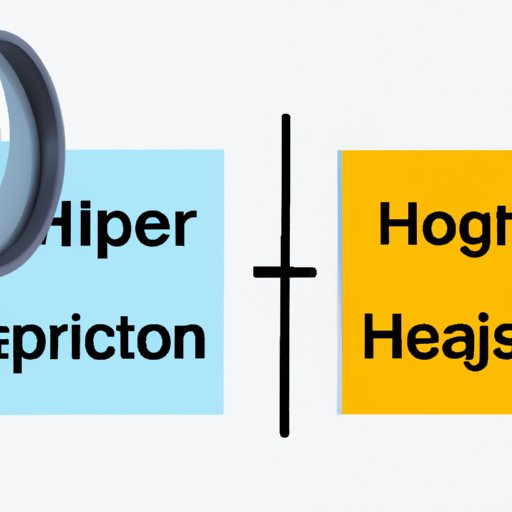
Introduction
Health inspectors play a crucial role in society, ensuring that public health and safety regulations are enforced. These professionals conduct thorough inspections of various establishments, including hospitals, restaurants, and food processing plants, to ensure that they comply with regulatory requirements related to sanitation, food safety, and environmental health. In this article, we will take an in-depth look at how much health inspectors make, highlighting different aspects of their salary range in various industries and states in the United States.
The Pay Scale of Health Inspectors: How Much Can You Really Make in This Field?
Before pursuing a career in health inspection, you will likely be interested in knowing how much you can expect to earn. According to the Bureau of Labor Statistics, the median annual wage for Health Inspectors was $50,780 in May 2020. Pay rates, however, vary depending on multiple factors such as location, years of experience, and industry.
The following chart provides some insight into the ranges of salary a health inspector may earn in different industries and regions:
| Region | Minimum Annual Salary | Maximum Annual Salary |
|---|---|---|
| New York | $43,460 | $122,200 |
| Los Angeles | $35,080 | $95,190 |
| Chicago | $40,350 | $90,660 |
| Texas | $32,350 | $96,640 |
It is important to note that the above ranges of salary are only an overview and might not include other incentives like bonuses and other benefits.
The Impact of Experience on Health Inspector Salaries: A Comprehensive Study
Experience is a crucial factor in the health inspector field. As professionals gain additional work experience in this field, they can expect to earn higher salaries than their less experienced counterparts.
For example, entry-level inspectors in the United States earn an average salary of $44,553 per year. Those with five to nine years of experience earn $51,808 per year, while those with ten to nineteen years of experience earn $60,274 per year. Inspectors with more than twenty years of experience earn an average salary of $63,464 per year.
It is also worth noting that the degree of seniority is often accompanied by an expansion in job responsibilities and higher incomes. Health inspectors who advance to management and supervisory roles frequently increase their earnings from $70,000 to $120,000 annually.
Achieving a High-Paying Health Inspector Job: Tips and Tricks
When entering the health inspector field, several helpful tips and strategies could assist you in landing a high-paying job in the industry:
Firstly, it is crucial to hold tertiary qualifications in a related field and attain adequate licensure and certification. A degree provides a solid foundation for the role’s fundamental principles, making candidates more attractive to employers.
The second step is to develop and acquire the necessary skills. Practical abilities such as critical thinking, attention to detail, clear communication, and the ability to operate remotely are all essential.
Finally, due to the highly competitive nature of the field and the increasing number of health inspector applicants, it is beneficial to build and maintain a strong professional network and engage in rigorous job searching to boost chances of success.
What You Need to Know About Health Inspector Salaries
Apart from the salary ranges and essential tips to establish a career in this field, there are some lesser-known facts about health inspector earnings:
Other names used to describe health inspectors are ‘Environmental Health Specialist’ and ‘Food Inspector.’ Careers in these areas are identical in requirements and salary, depending on specific positions.
Moreover, the health inspector job usually comes with benefits like health insurance, vacations, and job security. These are essential factors to consider while analyzing the worth of a particular salary.
The Future of Health Inspector Salaries: Projections for the Next Decade
According to the United States Bureau of Labor Statistics, the health inspector field is projected to grow by 4% between 2019 and 2029, consistent with the expected average growth rate for all occupations.
The aging population in the United States is the principal factor behind the growth in health inspectors’ need. This increase will also likely lead to more job opportunities and a better salary quote for the industry.
Gender and Race Pay Gaps in Health Inspector Salaries
Like most professions, the health inspector industry has lurking inequalities concerning gender and race. Although these differences are relatively minimal, it is a vital factor that people need to know.
Gender and race pay gaps occur when women or people of certain races earn less than men or their white counterparts for the same job. In the United States, African-American and white inspectors receive similar salaries, while female inspectors earn around 17% less than men per year.
To reduce these inequalities, there must be an intentional effort towards building and creating career opportunities such as mentorships, scholarships, and transparent hiring practices to assist women and people of disparate racial backgrounds in obtaining high-paying positions.
Conclusion
In conclusion, according to the Bureau of Labor Statistics, health inspectors’ job growth is expected to increase in the upcoming decade. As the field continues to advance, it is crucial to understand not only the base salary ranges but also factors like experience, education, and industry trends that shape salary rates. Nevertheless, ensuring to address inequality gaps inherent to the industry can lead to a brighter future with more accessible career opportunities and fair compensation for all.





